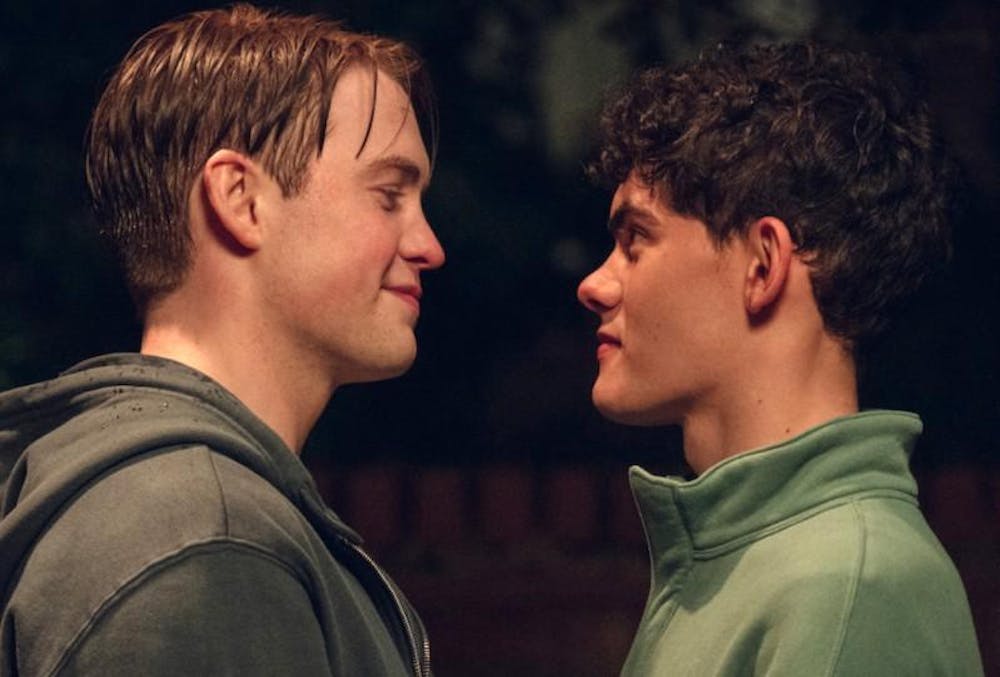On Oct. 3, Netflix released the third season of the critically acclaimed series “Heartstopper,” based on Alice Oseman’s webcomic and graphic novel series of the same name. The new season adds a more serious and emotional element to the show’s narrative.
When viewers last saw the characters, some of the show’s most serious themes had just begun to surface. The second season ended with Nick (Kit Connor) publicly coming out as bisexual and Charlie (Joe Locke) opening up to him about his past experiences with self-harm and mental health issues. Isaac (Tobie Donovan) was coming to terms with his asexuality and Darcy (Kizzy Edgell) was kicked out of their home by their homophobic mother.
Some viewers of “Heartstopper” have criticized the series as an unrealistic representation of queer love, claiming it is too much of a “fairytale romance” and devoid of “true” conflict. But the third season puts these accusations to rest.
While the season begins with Charlie struggling to confess his love to Nick, the focus quickly shifts to his eating disorder, as both Nick and Tori (Jenny Walser), Charlie’s sister, express their concerns for his well-being. As the season progresses, audiences watch as Charlie undergoes treatment and therapy for his anorexia and OCD, while some members of his friend group deal with anxieties concerning their future plans for university.
The season also follows the characters as they move out of the honeymoon phases of their respective relationships, introducing more conflict between partners. Tara (Corinna Brown) and Darcy work out issues stemming from their shared living situation, while Tao (William Gao) grapples with loneliness after his girlfriend Elle (Yasmin Finney) transfers to an art school. Nick and Charlie’s relationship also becomes rockier as the two attempt to remain together through Charlie’s worsening mental health. This more realistic representation of teenage romance allows the series to better connect with its audience. It shows that even the most perfect couples have their disputes, but that these don’t define their relationships and — in Nick and Charlie’s case — may even strengthen their bond.
The characters continue to discover and struggle with their sexualities and gender identities throughout the season. Darcy tries out they/them pronouns — and ultimately comes out as non-binary — and Imogen (Rhea Norwood) navigates her sexuality. Meanwhile, Elle, who is trans, tackles her gender dysphoria as her relationship with Tao develops, and Tori confronts her feelings towards her new love interest, Michael (Darragh Hand). The diversity of situations presented in the series ensures that it will connect with a variety of viewers who may be discovering their own queerness and confronting changes in their identity.
Common anxieties experienced by teenagers also pop up as plot points during the course of the season. Some of these concerns are depicted in a serious tone — such as Charlie’s hesitancy to have sex due to his body dysmorphia — while others, like the characters’ experimentation with alcohol, are presented in a much more humorous manner.
The only real downside of this season is the absence of fan-favorite actress Olivia Colman, who skillfully portrayed Nick’s mother Sarah in the first two seasons. Colman had to depart the series due to her busy schedule and commitments to other projects.
The authentic nature of the plot and realistic interactions in the third season add depth to the rose-colored world of “Heartstopper.” No matter how cringy the series may be, it is still able to connect with audiences who may be living through similar situations and give insight into the experiences of queer teenagers.
As of now, the series is not officially renewed for a fourth season, and Oseman has indicated that the fourth season might be the show’s last. Until Netflix releases further news, however, audiences can binge watch season three of “Heartstopper” and catch up on all the webcomics to prepare themselves for the potential series finale.
Manav is a junior from Indiana, concentrating in International and Public Affairs. In his free time, he likes attempting the daily Connections puzzle or falling down Wikipedia rabbit holes.





